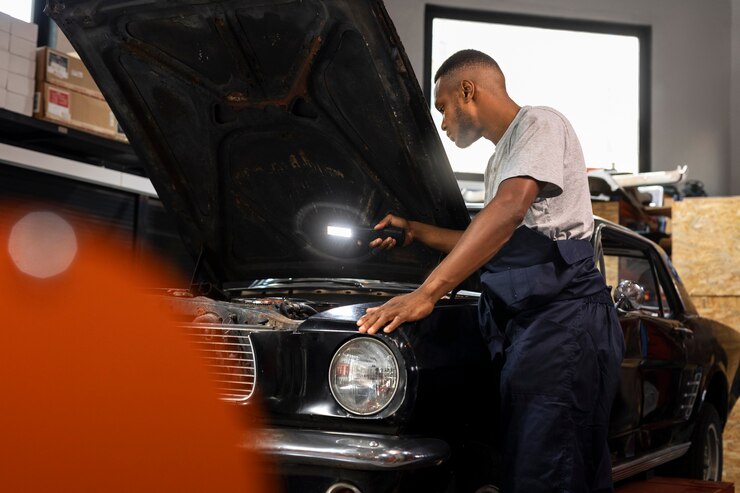Helming what was once a widely read automotive newspaper column (Car Clinic, Daily Nation: 2010 – 2022) taught me one thing: precious few of us understand the motor vehicle, and even fewer know what it takes to keep one running faultlessly for any extended period of time. From uncertainty over service intervals and recommended sundries, to falling prey to conniving mechanics to penny-pinching via corner-cutting – either by buying cheap knockoff parts or forgoing preventative maintenance altogether; the most accurate description one can accord to the average Kenyan motorist is also the most brutal, but the truth is uncomfortable. They can only be described as “toxic”.
Granted, a very small subset of the motoring public has received any kind of automotive training, formal or informal; but you don’t need special training to manage a regular vehicle.
Watch any premier league football match broadcast and observe the pundits discuss at length the finer intricacies of player deployment, attack and defence strategies, resource management, substitutions, team cohesion and psychology; and you’d be forgiven to assume they belong to the ranks of overpaid and unnecessarily famous managers.
It takes a lot of arcane knowledge to spew that kind of tactical drivel with the confidence these barflies exude, and yet some of these armchair tacticians have grounded or mechanically unsound vehicles stashed away out of sight as they dismissively tell anyone who cares to listen that “gari yangu iko na shida ya sensor” (my car has a sensor problem).
Oddly enough, unlike the world of football with its myriad rules about offsides, corner kicks, red cards and penalties, the rules of motor vehicle maintenance boil down to only three simple things:
- Routine: perform maintenance on your car and replace the sundries on schedule and/or on demand.
- Fidelity: perform this maintenance using tried and tested resources
- Deflation: put aside your pride and admit to what you don’t know. A corollary to this is: if unsure about something, ask.
I have seen all three rules broken with oftentimes spectacular, sometimes heartbreaking and occasionally hilarious results. I have seen a Mitsubishi Lancer Evolution X with a twin-clutch SST gearbox so neglected that when the vehicle eventually packed it in and refused to budge, it was brought in only for us to discover the transmission fluid had never been changed so it was no longer a fluid, it had become a gel or a paste. We had to scoop it out using sticks.
I have seen what happens when one buys fake parts or goes to a sham of a mechanic. Not only have I seen this, but I have been in the thick of it too, myself. I once had a twin-turbo BH5 Subaru Legacy GT-B E Tune II Revision D that blew a gasket. What should have been a simple heads off-gasket off- gasket on-heads on operation turned into a very expensive engine replacement after the operation went sideways as a result of incompetence. I should have paid closer attention when the mechanic kept referring to his own twin-turbo in the past tense just before accepting my contract…
I have also seen what happens when people trust their own ill-informed judgement against the word of the experts. I will not go into details but let’s just say, a steadfast refusal to service the braking system in the belief that the owner could “drive around the problem” led to an incomplete journey complete with fatalities. It still haunts me to this day.
There has been a proliferation of digital forums and the creation of a variety of owner’s clubs most of which are brand and/or model-specific. Some go further into era and/or genre specificity. These coalitions are treasure troves of information and advice, more so pertaining to points 2 and 3 above: they provide contact addresses and recommendations of what to get and where to get them, and they are a repository of informative detail should you run into problems or simply want information.
There is also the consumption of media. It behoves you to be circumspect about what you absorb and what you disregard. With the spread of social media comes the spread of what I once referred to a “Propshaft Prophets”, purveyors of misinformation and agents of disinformation. They disseminate wrong or unverified claims in the name of fact. Choose your influencer wisely; and if unable to, avoid them altogether.
*****

How to maintain your car:
- Establish useful networks
- Buy the right car
- Prevention is better than cure, timeliness means everything
- Empower yourself
Establishing Networks
Start with a bit of due diligence. Word of mouth is the most powerful form of advertising, so watch out for the mechanics, garages and parts suppliers who are always being given as references either in general or in forums specific to your car make and/or model; or you could ask outright and quietly run your own poll. That of course means you should join the right forums. Social media is full of them.
The other alternative is to acquire membership of a convenience service such as the one offered by AA Kenya. They will do all the heavy lifting for you; all you need to do is sign up and at your moment of need, dial a number and state your needs or predicament.
(This is not plugging, the service actually works; more so for those who lack the time or inclination to visit the digital space on the regular)
Buying the Right Vehicle
There is a reason motoring journalism exists. It serves as a portal of news and information about every single aspect of the automotive industry; but of course our claim to fame and notoriety comes from the car reviews we do every now and then. Some are first impressions, some involve collection of vital statistics and some are drawn out long term tests. It is this third lot that you should pay particular attention to.
We test motor vehicles so that you don’t have to. We push them hard, we strip them down and we comb them through to get all the information we can out of them and send this information to you so that come decision time, you are not starting from a position of complete darkness.
These car reviews unveil enough information to guide your next purchase and sometimes this information contains a reliability index. Is the vehicle dependable or will it spend more time on jack-stands than on marked roads?
Prevention Is The Mother of All Cures
It beggars belief that such an obvious thing would warrant repeating or reminding but as earlier stated, we have… seen things. Economic times may be tough but there is what you can get away with when fudging your maintenance schedule and there is what you can’t.
Spark plug replacement? You can skip it. Braking system? Death awaits.
While it may seem thrifty and financially savvy to squeeze as much life out of a component before sending it to the dugout, try not to. Extending a service interval could lead to a seized engine which means an expensive rebuild or even more expensive replacement. Overstretching tyre life could lead to a blowout with outcomes that are both painful and expensive. If you can’t afford some maintenance steps, sometimes it’s best to just park your car until such a time as when you can replace it comes around
Empower Yourself
Acquire a little knowledge about cars and their systems. Don’t be completely clueless to the point of being at the mercy of any joker who can correctly spell the words “crankshaft position sensor”.
But Why Even Bother?
Strangely enough, all this could be for nothing, particularly the fourth entry. Technology is changing at an alarming rate. We grew up with carburettors which have since been superseded by electronic fuel injection. Now we have hybrid cars and we have EVs which were touted as the future but some upstart car companies now claim hydrogen is the way. Let’s not forget cars have advanced safety systems, a lot of them are self-parking and many others seek self-driving (autonomous) capability. Who is supposed to memorize all this technology?
Not you, as it turns out. Over the years a lot of car manufacturers are taking repair capability away from the common man and limiting it to approved forecourts only. Ferrari has done this for the longest time, machining their hardware to be accessible by proprietary tooling only available at approved dealerships. Given that something as “simple” as a clutch replacement on a mid-engine V8 involves excising half the bodywork and dropping both the engine and gearbox, you will not find many people outside of Ferrari willing to undertake such an operation.
It’s not just in the upper levels of car strata. Toyota uses proprietary software in their ECUs that you cannot hack, it’s simply locked. John Deere in America did it with their on-board diagnostics system, a decision that drew the ire of their clients and led to a drawn-out lawsuit over something called the Right to Repair.
As more and more incidences like this come to light, and as cars continue increasing in complexity, it will become ultimately pointless trying to learn anything beyond the bare minimum. Once upon a time, we could open the backs of our Nokia 3310s and Compaq desktops to replace the batteries and clean the fans respectively. But now? Smartphones come with non-detachable batteries; some even have permanent rear covers that cannot be opened by anyone except the trained repairman at the brand outlet. The same thing applies to laptops: they are sealed shut with screws that are barely visible to the naked eye. For both devices, once they act up you either discard it and replace; or take it to a specialist. The same thing will apply to vehicles very soon

Good information
very informative and insightful